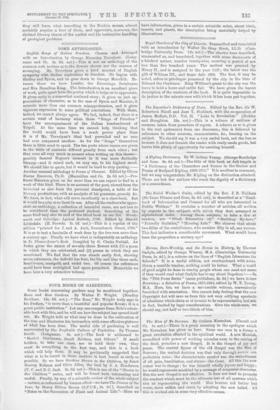SOME ANTHOLOGIES.
English Songs of Italian Freedom. Chosen and Arranged with an Introduction by George Macaulay Trevelyan. (Long- mans and Co. 3s. 6d. not.)—This is not an anthology of the common sort, neither as to the flowers chosen nor the manner of arranging. Mr. Trevelyan gives a brief account of English sympathy with Italian aspirations to freedom. He begins with Shelley and Byron, and he goes down to George Meredith. Be- tween these we have Lander, the Brownings, Swinburne and Mrs. Hamilton King. The Introduction is an excellent piece of work, quite apart from the poetry which it helps us to appreciate. It gives unity to a somewhat confused story ; it gives us just ap- preciations of character, as in the case of Byron and Mazzini; it corrects more than one common misapprehension, and it gives vigorous expression to some political convictions. With those, indeed, we cannot always agree. We feel, indeed, that there is a certain want of harmony when these "Songs of Freedom" • have the accompaniment of the Italian bombardment of Tripoli. At the same time we cannot help thinking that the world would have been a much poorer place than it is if Mr. Trevelyan's ideal had prevailed and no race had ever conquered another. As for the "Songs" themselves there is little need to speak. The ten poets whose names are given in the table of contents differed greatly from each other ; but they were all very much in earnest when writing on this theme— possibly Samuel Rogers's interest in it was more distinctly literary—and it raised each, we may say, to his highest mood. We should like to quote, but it would be hard to stop quoting. Another unusual anthology is Poems of Chaucer. Edited by Oliver Farrar Emerson, Ph.D. (Macmillan and Co. 2s. 6d. net.)—Pro- fessor Emerson gives us far more than we can expect to find in a work of this kind. There is an account of the poet, viewed from the historical as also from the personal standpoint, a table of his literary productions, with an analysis of his grammar, prosody &e. We have, in fact, what will servo excellently as a class-book. But it would be a pity so to limit its use. After all the roaderswho appre- ciate an anthology, a collection of beautiful verse, are not less to be considered than the professed student. Something of the same kind may also be said of the third book on our list. Words- north and Coleridge: Lyrical Ballads, 1798. Edited by Harold Littledale. (H. Frowde. 2s. 6d. net.)—This is a reprint of the edition "printed for J. and A. Arch, Gracechurch Street, 1798." It is as to text a facsimile of work done by the two men more than a century ago. Finally we have what is indisputably an anthology in Ye Plower-Lover's Book. Compiled by G. Clarke Nuttall. An Index gives the names of seventy-three flowers with (1) a poem in which they are celebrated, and (2) poems in which they are mentioned. We find that the rose stands easily first, showing seven references, the daffodil has four, the lily and lilac three each, heart's-ease, marigold, and violet two. Of course the references could have been multiplied had space permitted. Meanwhile we have hero a very attractive volume.






















































 Previous page
Previous page